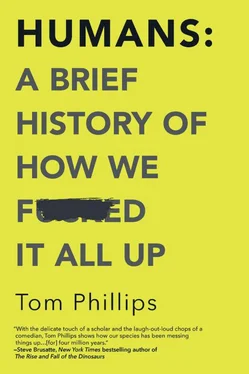Tom Phillips - Humans - A Brief History of How We F*cked It All Up
Здесь есть возможность читать онлайн «Tom Phillips - Humans - A Brief History of How We F*cked It All Up» весь текст электронной книги совершенно бесплатно (целиком полную версию без сокращений). В некоторых случаях можно слушать аудио, скачать через торрент в формате fb2 и присутствует краткое содержание. Город: Toronto, Год выпуска: 2019, ISBN: 2019, Издательство: Hanover Square Press, Жанр: История, Юмористические книги, на английском языке. Описание произведения, (предисловие) а так же отзывы посетителей доступны на портале библиотеки ЛибКат.
- Название:Humans: A Brief History of How We F*cked It All Up
- Автор:
- Издательство:Hanover Square Press
- Жанр:
- Год:2019
- Город:Toronto
- ISBN:978-1-48805-113-5
- Рейтинг книги:4 / 5. Голосов: 1
-
Избранное:Добавить в избранное
- Отзывы:
-
Ваша оценка:
- 80
- 1
- 2
- 3
- 4
- 5
Humans: A Brief History of How We F*cked It All Up: краткое содержание, описание и аннотация
Предлагаем к чтению аннотацию, описание, краткое содержание или предисловие (зависит от того, что написал сам автор книги «Humans: A Brief History of How We F*cked It All Up»). Если вы не нашли необходимую информацию о книге — напишите в комментариях, мы постараемся отыскать её.
Humans: A Brief History of How We F*cked It All Up — читать онлайн бесплатно полную книгу (весь текст) целиком
Ниже представлен текст книги, разбитый по страницам. Система сохранения места последней прочитанной страницы, позволяет с удобством читать онлайн бесплатно книгу «Humans: A Brief History of How We F*cked It All Up», без необходимости каждый раз заново искать на чём Вы остановились. Поставьте закладку, и сможете в любой момент перейти на страницу, на которой закончили чтение.
Интервал:
Закладка:
So no, it wasn’t disagreement about the roundness of the earth. The skepticism about Columbus’s venture came from an entirely different source. The problem was that Christopher Columbus had utterly messed up his units of measurement, so got his sums completely wrong.
His entire plan for the mission was based on his personal calculations of two things: how big the earth was, and how big Asia was. On both of these, he was wildly off. For one, he decided that Asia was an awful lot longer than it actually is (and it is pretty long), and that, as such, with a fair wind he’d eventually find Japan several thousand miles to the east of Japan’s actual location. But even worse, he based his calculations of the globe’s circumference on the work of the ninth-century Persian astronomer Ahmad ibn Muhammad ibn Kathir al-Farghani. This wasn’t a great start, as there had been more accurate estimates around since the Greek mathematician Eratosthenes of Cyrene pretty much nailed it 1,700 years earlier. But even that wasn’t Columbus’s biggest mistake.
His biggest mistake was his assumption that when al-Farghani said “mile,” he was obviously talking about the Roman mile, which was around 4,850 feet. That is not what al-Farghani was talking about. He was talking about the Arabic mile, which is somewhere between 6,500 and 7,000 feet. So when al-Farghani said that something was a certain number of miles away, he actually meant a much, much bigger distance than Columbus realized.
Fans of the movie This Is Spinal Tap will be familiar with what Christopher did there. He confused one unit of measurement with a completely different unit of measurement, and so came up with a model that was ridiculously small. Columbus thought that the world was only about three quarters of the size it actually is. Combined with his decision to relocate Japan by several thousand miles, the upshot was that he thought he needed to pack supplies for a much shorter journey than the one he faced. Plenty of his contemporaries were all like, “Think you’ve got the world the wrong size there, Chris,” but he remained convinced by his calculations. So on the whole, it was pretty lucky for him that he bumped into the Caribbean when he did. (Nobody had really given serious thought to the possibility that there was a whole extra continent in exactly the place that Asia wasn’t.)
It’s probably worth adding that his erroneous assumption about which kind of mile al-Farghani was talking about reflects some pretty Eurocentric thinking on Columbus’s part! But let’s be honest: this was nowhere near the worst thing Christopher Columbus did because his thinking was too Eurocentric.
It’s tempting to wonder how different world history might have been if Columbus had been better at math and so never set out on his voyage. The answer is: probably not much, except maybe some more people might speak Portuguese now. The Portuguese were the best sailors and navigators in Europe at the time (Columbus’s expedition was only funded by Spain because Portugal rejected it first, on the grounds that they knew perfectly well he’d fucked the math), and they would land on various bits of the Americas in the following years. Pedro Álvares Cabral reached Brazil in 1500. One year later, the Corte-Real brothers reached either Labrador or Newfoundland, where in a sign of things to come they promptly kidnapped 57 natives and sold them as slaves.
In fact, the thing that would really have made a difference to the history of Old World–New World relations is if anybody, literally anybody, had been able to constrain their natural impulse to murder or kidnap the first people they met. A whole five centuries before Columbus, the Vikings were the actual first Europeans to establish a settlement in the Americas, with Leif Eriksson setting out from the Viking colony on Greenland and coming upon what they decided to call Vinland (“Wine Land,” which was likely modern-day Newfoundland). Compared to barren and extremely un-fun Greenland, the woods and fruits of Vinland should have been great news for the Vikings, and they did indeed establish a trading colony there for some years. Unfortunately, their prospects for trade with the locals of Vinland (likely the Thule people, or Skraelings as the Vikings called them) were somewhat diminished by what happened the first time they encountered each other.
This was the first meeting between Europeans and Americans in recorded history, and it went something like this: the Vikings found a group of 10 natives sleeping under their upturned canoes, and so they murdered them.
For fuck’s sake, guys.
Unsurprisingly, after that the locals weren’t terribly keen on trading with the Vikings, and skirmishes between the two groups were common—including one battle in which the fearsome Vikings, armed with swords, were almost defeated by “a pole with a huge knob on the end” (likely an inflated animal bladder), “which flew over the heads of the men and made a frightening noise when it fell.” The Vikings were so scared of the novelty balloon that they would have lost the fight if Freydis Eriksdottir, Leif’s sister, hadn’t alarmed the Skraelings in turn by exposing her breasts.
As a result of this and other less weird battles, the Vinland settlement never really got off the ground. The Vikings of Greenland abandoned it after a decade or two. What’s more, the Greenland settlement itself—which only came into existence in the first place because Erik the Red had been exiled there for murdering people—gradually withered and died over the following centuries, as the rest of the Vikings back in Nordic lands largely stopped paying attention to it.
If things had gone a bit differently on Vinland, ideally with less murder, then history might genuinely have taken a different course. An established trading route between the Americas and Europe, with all the exchange of knowledge and skills that can lead to, might have resulted in a more gradual exposure between the two populations. It could have meant that the gap in technology and military might that made European colonization in the sixteenth century such a one-sided affair would have been less dramatic. (It might also have given the Americans more time to slowly develop resistance to Old World infectious diseases, rather than getting hit with a mother lode of them all at once.)
Equally, things might have been different if Abubakari II, the ruler of the Malian empire in the fourteenth century, had come back from his voyages. The emperor of one of the world’s largest and wealthiest empires at the time, spanning much of West Africa, he gave up his throne, his power and his riches in order to satisfy his curiosity about whether there was a “bank” on the other side of the ocean. In 1312, he set sail from modern-day Gambia, supposedly with a fleet of 2,000 ships—none of which were ever seen again. Some Malian historians argue that he may in fact have reached the shores of Brazil, but even if he did, he never made it back, which let’s be honest is a fairly crucial component of the exploration business.
Or perhaps it could never have been different, and this is just the way we are. When you zoom out far enough, a lot of human history is just the story of empires rising and falling and killing the crap out of each other. Like agriculture, and leaders, and war—all the things that in turn helped to kick off the age of empire—they don’t necessarily win because they’re the best long-term plan for humanity, but because once somebody decides to do it, pretty much everybody else has to join in or get crushed. It’s like a bar fight in an old Western, except lots of people don’t get up when the piano starts playing again.
When Columbus managed to accidentally sink the Santa María on the shores of Hispaniola in 1492, the population of the indigenous Taíno people on the island numbered in the hundreds of thousands. A little over two decades later, after the Spanish introduced mining, slavery and disease, there were only 32,000 of them left. Columbus was bad at math, sure, but it definitely wasn’t his worst mistake.
Читать дальшеИнтервал:
Закладка:
Похожие книги на «Humans: A Brief History of How We F*cked It All Up»
Представляем Вашему вниманию похожие книги на «Humans: A Brief History of How We F*cked It All Up» списком для выбора. Мы отобрали схожую по названию и смыслу литературу в надежде предоставить читателям больше вариантов отыскать новые, интересные, ещё непрочитанные произведения.
Обсуждение, отзывы о книге «Humans: A Brief History of How We F*cked It All Up» и просто собственные мнения читателей. Оставьте ваши комментарии, напишите, что Вы думаете о произведении, его смысле или главных героях. Укажите что конкретно понравилось, а что нет, и почему Вы так считаете.












